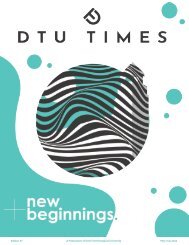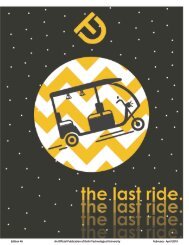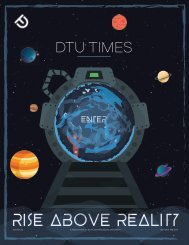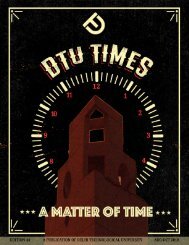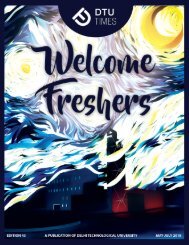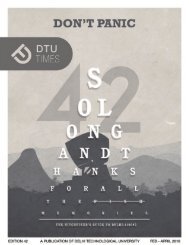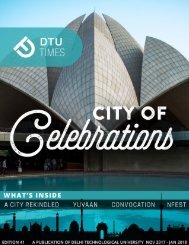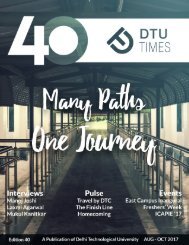Create successful ePaper yourself
Turn your PDF publications into a flip-book with our unique Google optimized e-Paper software.
Madhusudan
Bansal
DTU Times interviewed Madhusudan Bansal, AE, Class of
2020, who got recommended for the Indian Army, Indian
Navy, as well as the Indian Air Force.
What was your preparation strategy for the exam and the SSB Interview?
Having cleared JEE, passing end semesters and aptitude tests at TNP,
I think we all have enough strategies to ace any written exam. The real
challenge was the SSB, with a selection rate of around 3-5% and many
batches having zero selections.
It is said that the first step towards improvement is acceptance. So, I began
to observe my behaviour, actions and emotions while trying to keep
judgements away. This helped me become more aware of myself and my
surroundings. I joined a Toastmasters Club that gave me a platform to
speak my mind, working in and leading a team. SSB is not about reading
particular books and memorising facts. Their assessment is based on
15 OLQs (Officer Like Qualities). My strategy was to understand their
requirements and build those OLQs from within. Everybody has it in
them. The trick lies in being able to present them appropriately.
What was the most challenging aspect of the interview for you? How did
you prepare for it?
The SSB is divided into three phases of assessment - Psychological Testing
(Manasa), Interview Testing (Vacha) and Group Testing (Karmana). For
me, the tricky part was to analyse my psychology and mould my responses
to match those of an ideal candidate. Some present their ideas impromptu
and believe in spontaneity. I believe in practice, so I strategise accordingly.
Writing stories, sentences, practising reactions and self-description was
something I made a habit.
Even after my first recommendation, I continued working on improving
the quality of my responses with my other defence aspirant friends.
Evaluating each other helped us to identify gaps, come up with better
ideas and keep the motivation high. The interviewing officer may even
dig into intimate details of your life, including bad habits, girlfriends,
biggest mistake, fears, weaknesses, regrets, etc. The best thing about truth
is that you don’t have to memorise it. I am not that truthful, to be honest.
I prepared for my lies, looked him directly in the eye and told him stories
that I had rehearsed to support those lies. My father tells me, “Speak the
truth, always. But when you have to lie, do it with confidence”.
How was your overall experience of the 5-day selection process? How did
you deal with the pressure involved?
The overall experience depends on the result. Once you get through, you
stop thinking about the mistakes you’ve made, or the questions you didn’t
know the answers to. You stop worrying about the parts you messed up.
Once you’re in, it becomes a memorable experience. You reminisce the
witty answers you gave in the interview, the point in the group discussion
that flummoxed everybody. Up until then, it’s a lot of pressure, anxiety
and mental exhaustion. You force a smile on your face, trying to make
everyone like you, especially the assessors and your groupmates. The SSB
is like playing a sport. The pressure is part of the process. You can’t let it
get to your head or reflect on your face. The trick is to smile through it.
Read the full interviews on dtutimes.dtu.ac.in/blog
DTU TIMES | February 2020- May 2020 | 39










